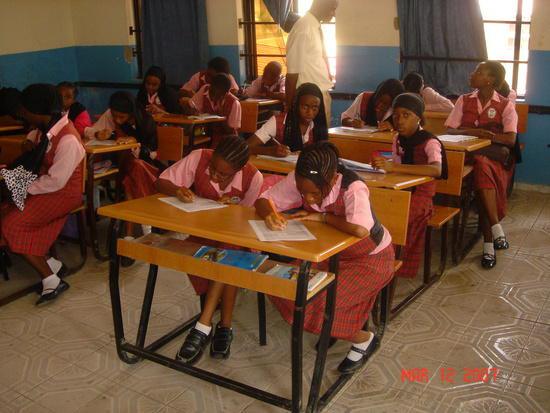Democracy & Governance
Feeding Of Primary School Pupils: Another Farce By The Government -By Segun Ogunlade

The Federal Government of Nigeria through the Ministry of Welfare and Disaster Management has decided to continue with its school-feeding programmes for pupils in primary schools nationwide. This sounded like a good act and it could be said that the government is now being responsive to some of the needs of the citizens. For hitherto, the Federal Government said palliatives have been given to a class of citizens they called the poorest of the poor. Now, it is coming up with feeding primary school pupils nationwide to further alleviate the struggle that some of the parents are facing in feeding their children. With this, it appears some people are looking for ways to make themselves look good in the face of the people and to say they have put the millions they have collected into good use. Anywhere else, this initiative would have been applauded. But in our country, the initiative raises more questions than it sort to answer.
As it is, the feasibility of this initiative remains doubtful and largely impossible if one begins to look at the intention beyond the face value. It is not certain if the Federal Government has the data of all pupils in primary school and even that of all the people living in the country at large. These include the names, age, address and name of the parents of these pupils. If this is so, then it would make the exercise a futile one even before it starts. This is because an inaccurate data is no data at all. If there is no accurate data on all the names and address of all pupils in primary school nationwide, one could then ask how the Federal Government would serve them the food in their homes when the official of the government doesn’t have the correct information on the number of pupils that are enrolled in primary school nationwide. It is not surprising that the country is not adept at keeping data. Many of our leaders have phobias for accurate data. Oftentimes, we wait for other people in other countries to give statistics about events in Nigeria and then we refute such statistics without giving ours to counter it.
Again, one could how the food would be shared to make it go round to all pupils in the country, which is the problem the Federal Government intends to solve. Peradventure food centres would be opened in each local government. This sounds better than saying food centres should be opened in each town and village of every state. So, imagine the Federal Government opens a collection centre in every local government. This would require the parents to transport themselves to where the food is being shared in cases where they don’t live close to the collection centre. If the money that would be spent on transportation is more than the value of the food, many parents would forgo the food altogether and then the purpose of the programme would be defeated. To get the food to pupils in their homes, how many people would the Federal Government employ to share the food? How would these people get to all the houses that have a primary school pupil when there is no data? Even if there is data on all the pupils, the food wouldn’t get to all of them before the day runs out. The Federal Government cannot afford to share stale food for pupils at this time.
Of course, the best way for the government to go about the feeding programme would have been to get the account numbers of parents that have pupils in primary school through a central database. From there, money could be forwarded to them to get food for their children. But the people in charge of these programme would most likely not want to do it because it would mean they would have to be accountable, one thing that everybody in position of authority in the country resents. They would rather opt for sharing the food either from street to street, house to house, community to community or local government to local government because only few people would be reached via that method. Our leaders have a penchant for making things simple things look difficult than they are and when such things failed, the masses don’t call to question the actions of their leaders.
The way I am seeing it, it is most likely that the food would be shared to only a selected few as was the case with the school-feeding programme where I have not seen a single child from my neighbourhood reported any food sharing event in his or school. The Federal Government could decide to give the food to only children of the poorest of the poor. Yet, if at the end of the day only a handpicked few were given the food and their number were used for all the pupils in the nation, nothing would happen. Nigeria is not place where corrupt officials of the state are punished by instruments of the state. The only few that have been punished for their sins were those they chose their alliances wrongly, therefore finding themselves on the wrong side of the divide. So far you align yourself with the right fellows, your sins would remain cover for a long time until you fall out of grace and your name finds its way to the black book.
No wonder many political leaders have dipped their whole bodies in the cookie jar and had their white garment stained with misdemeanour. Those with proven acts of larceny are parading the corridors of power and they enjoy more grace than the masses whose future is being made bleak. The pulchritude of our political leaders and their adorning of holy garments in holy places speak nothing to the way they conduct their businesses around the country’s treasury. So, if at the end of the day no pupil gets fed at all, the people in charge would still come out unscathed under the axe of justice.
Accountability is not one of the greatest hallmarks of the country. Most Nigerian leaders have never felt the need to embrace accountability. This is easy for them to do because instead of serving the people they were elected to serve, the people that elected them were the ones serving them. Nowhere in the world has it been recorded that a master is accountable to those under his rule. Our leaders have only succeeded in ruling us and have failed to govern us. That’s why they could do nothing anything and get away with it. The Law Courts where the masses are supposed to get respite now give judgments that call into question the learned claim of men of the bench. Instead of punishing people that dipped their hands where it didn’t belong and taking for themselves what wasn’t theirs to own, they condemn an old man to jail because he insulted the president. That is one of the ironies that one has to deal with as Nigerians and by living within the country’s border. Judgment is delayed against injustice and the hearts of many have continued to do that which is wrong.
If the Federal Ministry of Welfare and Disaster Management would be unwilling to have cash transferred directly to the parents but chose instead to have people cook and distribute the food, it meant accountability would again be dished as it was when the names of people that were given money as palliatives could not be provided because they said the poor were ashamed as being labelled as poor people. In the best interest of all that are concerned, accountability should be sought first of all. It doesn’t kill to be accountable when it comes to holding offices in trust for others if there is nothing to hide.
But if you ask me, I will say feeding primary school pupils isn’t really what the people needed at the time. After all, we have heard the Federal Government boast about giving food to children in primary school nationwide when in fact only few of them were given in selected states of the federations. At the end, a lot of money would be pumped into this and when it failed like many other initiatives of the government, nobody would be punished for it. It would be a classic case of adding salt to the injury because having resources wasted on failed programmes is not as worse as not punishing those that made it so.
Segun Ogunlade writes from Ibadan. He is a final year of the Department of Religious Studies, University of Ibadan, Ibadan. He could be reached via his email at ogunlade02@gmail.com or his number +2348085851773.



















